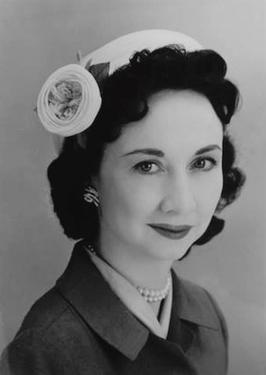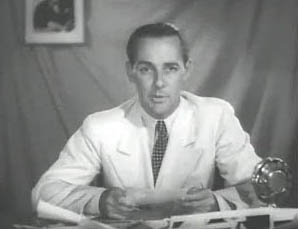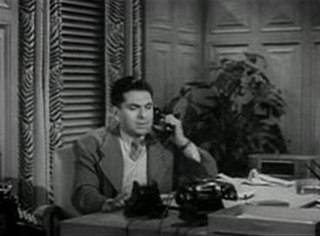Related Research Articles
A gossip columnist is someone who writes a gossip column in a newspaper or magazine, especially in a gossip magazine. Gossip columns are written in a light, informal style, and relate opinions about the personal lives or conduct of celebrities from show business, politicians, professional sports stars, and other wealthy people or public figures. Some gossip columnists broadcast segments on radio and television.

Walter Winchell was a syndicated American newspaper gossip columnist and radio news commentator. Originally a vaudeville performer, Winchell began his newspaper career as a Broadway reporter, critic and columnist for New York tabloids. He rose to national celebrity in the 1930s with Hearst newspaper chain syndication and a popular radio program. He was known for an innovative style of gossipy staccato news briefs, jokes, and Jazz Age slang. Biographer Neal Gabler claimed that his popularity and influence "turned journalism into a form of entertainment".

Elda Furry, known professionally as Hedda Hopper, was an American gossip columnist and actress. At the height of her influence in the 1940s, over 35 million people read her columns.

Louella Rose Oettinger, known professionally as Louella Parsons, was an American gossip columnist and a screenwriter. At her peak, her columns were read by 20 million people in 700 newspapers worldwide.

A columnist is a person who writes for publication in a series, creating an article that usually offers commentary and opinions. Columns appear in newspapers, magazines and other publications, including blogs. They take the form of a short essay by a specific writer who offers a personal point of view. Columns are sometimes written by a composite or a team, appearing under a pseudonym, or a brand name. Columnists typically write daily or weekly columns. Some columns are later collected and reprinted in book form.

Goodman Ace, born Goodman Aiskowitz, was an American humorist, radio writer and comedian, television writer, and magazine columnist.

Dorothy Mae Kilgallen was an American columnist, journalist, and television game show panelist. After spending two semesters at the College of New Rochelle, she started her career shortly before her 18th birthday as a reporter for the Hearst Corporation's New York Evening Journal. In 1938, she began her newspaper column "The Voice of Broadway", which was eventually syndicated to more than 140 papers. In 1950, she became a regular panelist on the television game show What's My Line?, continuing in the role until her death.

You Bet Your Life is an American comedy quiz series that has aired on both radio and television. The original version was hosted by Groucho Marx of the Marx Brothers, with announcer and sidekick George Fenneman. The show debuted on ABC Radio on October 27, 1947, moved to CBS Radio debuting October 5, 1949, and went to NBC-TV and NBC Radio on October 4, 1950. Because of its simple format, it was possible to broadcast the show on both radio and television but not simultaneously. Many of the laughs on the television show were evoked by Groucho's facial reactions and other visual gimmicks. So the two versions were slightly different. The last episode in a radio format aired on June 10, 1960. The series continued on television for another year, recording the last season, beginning on September 22, 1960, with a new title, The Groucho Show.

Mary Elizabeth Smith was an American gossip columnist. She was known as "The Grand Dame of Dish". Beginning her career in radio in the 1950s, for a time she also anonymously wrote the "Cholly Knickerbocker" gossip column for the Hearst newspapers. In the 1960s and early 1970s, she was the entertainment editor for the magazines Cosmopolitan and Sports Illustrated. Between 1976 and 2009, she wrote a self-titled gossip column for newspapers including New York Newsday, the New York Daily News and the New York Post that was syndicated in 60 to 70 other newspapers. On television, she appeared on Fox, E!, and WNBC.

Jimmie Fidler was an American columnist, journalist and radio and television personality. He wrote a Hollywood gossip column and was sometimes billed as Jimmy Fidler.

The Paramount Television Network, Inc. was a venture by American film corporation Paramount Pictures to organize a television network in the late 1940s. The company-built television stations KTLA in Los Angeles and WBKB in Chicago; it also invested $400,000 in the DuMont Television Network, which operated stations WABD in New York City, WTTG in Washington, D.C., and WDTV in Pittsburgh. Escalating disputes between Paramount and DuMont concerning breaches of contract, company control, and network competition erupted regularly between 1940 and 1956, culminating in the DuMont Network's dismantling. Television historian Timothy White called the clash between the two companies "one of the most unfortunate and dramatic episodes in the early history of the television industry."

Bonino is a thirty-minute ethnic situation comedy television series starring Ezio Pinza. Originating in the Hudson Theatre in New York City, the program aired live on NBC from September 12 to December 26, 1953. The show was also known as I, Bonino, an alternate title that many newspapers and columnists used in place of the official name when the series premiered.

TV Reader's Digest is the title of a 30-minute American television anthology drama series, which aired on ABC from January 17, 1955, to July 9, 1956. Its theme music was "Polonaise" from Act III of Eugene Onegin.

Estelita Rodriguez was a Cuban actress best known for her roles in many Westerns with Roy Rogers for Republic Pictures, as well as her role in Howard Hawks' Rio Bravo. Her birth date was in dispute; studio biographies claimed 1928, but her wedding announcement of May 1945 cited her age as 19 as certified before a superior court judge, which would place her year of birth at 1925.

Sidney Skolsky was an American writer best known as a Hollywood gossip columnist. He ranked with Hedda Hopper and Louella Parsons as the premier Hollywood gossip columnists of the first three decades of the sound picture era.

The Corpse Came C.O.D. is a 1947 American comedy mystery film directed by Henry Levin, produced by Samuel Bischoff and starring George Brent, Joan Blondell and Adele Jergens. The comedic mystery is notable for featuring cameos by Hollywood gossip columnists appearing as themselves: Harrison Carroll, Jimmy Fidler, George Fisher, Hedda Hopper, Erskine Johnson, Louella Parsons, and Sidney Skolsky. The movie is based on a novel by columnist Jimmy Starr, who also appears in the movie. The title makes reference to the practice of cash on delivery. It was produced and distributed by Columbia Pictures.
The Eddie Cantor Comedy Theatre is a half-hour filmed American comedy series produced by Eddie Cantor and made at Ziv Television Programs, Inc. for first-run syndication. Cantor hosted and performed on each show. Thirty-nine episodes were produced and aired in 1955 before Cantor decided the show was too much for him to continue doing.
Rowena Dolores Heath, also known as Dodie Heath and Dody Heath, was an American actress of stage, film, and television.

Harriet Lee was an American radio singer during the Golden Age of Radio in the 1920s–1930s. She was best known as a blues contralto on the Columbia Broadcasting System (CBS) and, later, NBC Radio Networks. Called the "Songbird of the Air", she was named Miss Radio 1931 based on nationwide submittals from radio stations, judged by Flo Ziegfeld and McClelland Barclay, to select the "most beautiful radio artist" for the Radio World's Fair in New York City. Lee was one of the highest paid radio stars that year. She hosted the Harriet Lee show on experimental New York City station W2XAB in 1931, making her one of the first singers to have a show on U.S. television.
Louis Sobol was a journalist, Broadway gossip columnist, and radio host. Sobol wrote for Hearst newspapers for forty years, and was considered one of the country's most popular columnists. Sobol wrote about celebrities during the years when well-known columnists themselves became celebrities.
References
- ↑ Barbas, Samantha (2005). The First Lady of Hollywood: A Biography of Louella Parsons . Berkeley, CA: University of California Press. p. 181. ISBN 978-0520242135.
- ↑ Dunning, John (1998). On the Air: The Encyclopedia of Old-Time Radio . Oxford University Press. p. 232. ISBN 0-19-507678-8 . Retrieved 9 April 2020.
- ↑ Johnson, Erskine (25 March 1963). "Hollywood Notes". Lakeland Ledger. Retrieved 24 September 2013.
- ↑ "Film Report". Ross Reports on Television including The Television Index. September 28, 1952. p. 7. Retrieved May 19, 2022.
- ↑ "Radio and Television: C. B. S. Video Network to Offer Tuesdays 'Actor's Studio,' Dropped by A. B. C." . The New York Times. October 29, 1949. p. 28. Retrieved June 16, 2022.